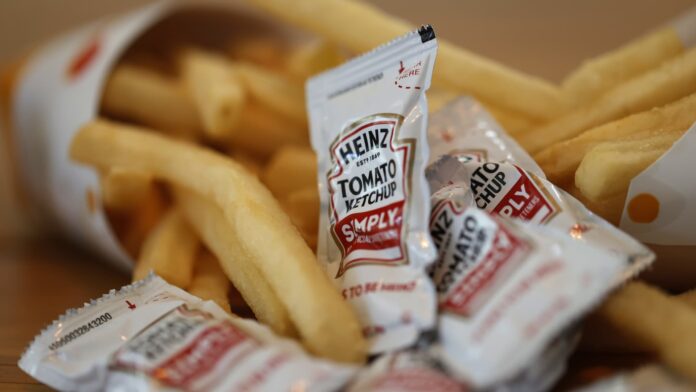Not all consumer staples will be impacted the same by currency fluctuations and changes in the international economy, said Goldman Sachs. Analyst Jason English upgraded Kraft Heinz to buy from neutral with a price target of $43, which is an upside of just over 30%, citing favorable conditions and a currently discounted price. Meanwhile, English downgraded Procter & Gamble to neutral from buy and lowered its price target to $143, an upside of 15% compared to more than 25% before the downgrade. “We expect the favorable pricing environment in the US to benefit our HPC coverage as well, but this is mitigated by currency exposure and a likely more onerous operating environment in Europe for what is generally a more global footprint for HPC companies relative to Food,” English said in a note to clients Sunday. Procter & Gamble, which he noted is a bellwether for the household and personal care sector, cannot continue to grow market share as it did during the height of the pandemic, when ownership of its supply chain made it able to move inventory when competitors could not. English also expects 5% headwinds from foreign exchange, pushing sales forecasts 70 basis points below consensus in 2023 even though the company should have organic growth. On the other hand, food-and-beverage company Kraft Heinz is better positioned compared to where it was a few years ago because it reduced private label exposure while optimizing its portfolio by selling some brands like Planters, English said. Down about 8% so far this year, English said the stock price is considered discounted and expects it to be re-rated higher as the food sector becomes more favorable with headwinds easing. Generally speaking, English said household and personal care companies do not have upsides completely priced in like food brands because the latter will see gains more strongly mitigated by exposure to foreign currencies. But he warned against making broad industry-wide conclusions without research into each company’s individual characteristics that will factor into how each one will perform. He also noted continued challenges for both related to labor constraints. “Relative valuation levels for Staples are daunting; now even richer than the onset of the last recession,” he said. “The group mostly seems less defensive to us today given the less support to our multiples especially if the group’s P/E recouples with rates. That said, some sub-sectors are richer than others and relative value can still be found.” But, “while valuation is an important consideration in our ratings changes,” he added, “there are fundamental drivers behind our evolving views as well.” — CNBC’s Michael Bloom contributed to this report.
© heardonwallstreet.com


